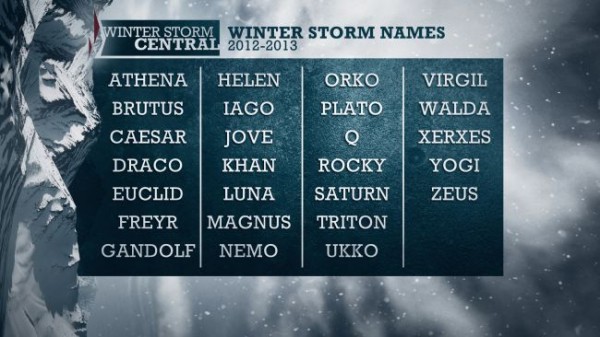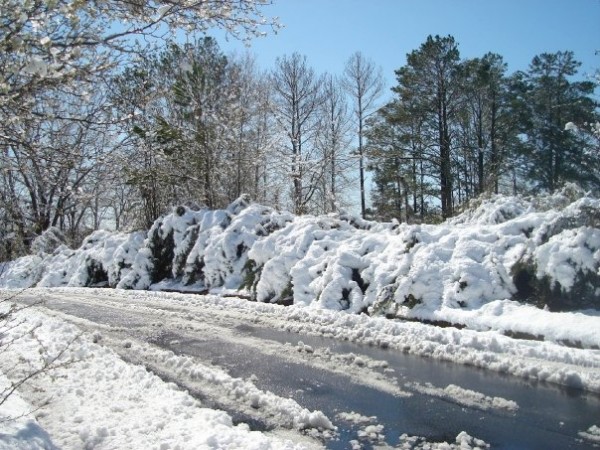In an effort to raise awareness of winter storms that impact portions of the United States, The Weather Channel, which provides 24 hour coverage of weather information and weather-related shows, decided that they will begin to name winter storms that develop for the 2012-2013 season.
The Weather Channel states that not only will naming a winter storm will raise awareness, but it will make it simpler to hashtag so everyone can communicate it through social media, and it would be easier to remember if we choose to look at that storm’s history in the future. Naming of winter storms is a practicing procedure in Europe, but this new system has never occurred in the United States. I do believe there is a lot of good in naming a system, but I and many other meteorologists find a few flaws in this naming system that the Weather Channel has decided to begin using for this upcoming winter. Will this new system work? What do other meteorologists think?

First of all, here is the full list the Weather Channel posted on their website for winter storm names:
Athena: The Greek goddess of wisdom, courage, inspirations, justice, mathematics and all things wonderful.
Brutus: Roman Senator and best known assassin of Julius Caesar.
Caesar: Title used by Roman and Byzantine emperors.
Draco: The first legislator of Athens in Ancient Greece.
Euclid: A mathematician in Ancient Greece, the father of geometry.
Freyr: A Norse god associated with fair weather, among other things.
Gandolf: A character in a 1896 fantasy novel in a pseudo-medieval countryside.
Helen: In Greek mythology, Helen of Troy was the daughter of Zeus.
Iago: Enemy of Othello in Shakespeare’s play, Othello.
Jove: The English name for Jupiter, the Roman god of light and sky.
Khan: Mongolian conqueror and emperor of the Mongol empire.
Luna: The divine embodiment of the moon in Roman mythology.
Magnus: The Father of Europe, Charlemagne the Great, in Latin: Carolus Magnus.
Nemo: A Greek boy’s name meaning “from the valley,” means “nobody” in Latin.
Orko: The thunder god in Basque mythology.
Plato: Greek philosopher and mathematician, who was named by his wrestling coach.
Q: The Broadway Express subway line in New York City.
Rocky: A single mountain in the Rockies.
Saturn: Roman god of time, also the namesake of the planet Saturn in our solar system.
Triton: In Greek mythology, the messenger of the deep sea, son of Poseidon.
Ukko: In Finnish mythology, the god of the sky and weather.
Virgil: One of ancient Rome’s greatest poets.
Walda: Name from Old German meaning “ruler.”
Xerxes: The fourth king of the Persian Achaemenid Empire, Xerxes the Great.
Yogi: People who do yoga.
Zeus: In Greek mythology, the supreme ruler of Mount Olympus and the gods who lived there.
Classifications for naming a winter storm:
In the Weather Channel’s release, they provided a short and brief description on the criteria it takes to name a storm. For now, these criteria descriptions are rather basic and subjective. According to Bryan Norcross, the Weather Channel will release more details on how the criteria works by next week and will have another press release around the beginning of November.
-Naming of winter storms will be limited to no more than three days before impact to ensure there is moderate to strong confidence the system will produce significant effects on a populated area.
-The time of day (rush hour vs. overnight) and the day of the week (weekday school and work travel vs. weekends) will be taken into consideration.
-Several variables that combine to produce disruptive impacts including snowfall, ice, wind and temperature.
-Nature of winter storms makes setting quantitative criteria difficult. It’s about societal impacts. Human element is needed. Impact on larger populations will be another contributor to naming winter storms.
-Criteria will be very subjective. In other words, to name a storm, it will all depend on how it will impact an area. Criteria for a storm in Minnesota will be completely different from a storm affecting Atlanta, Georgia.
Overall, the Weather Channel will name systems that will impact a large group of people. If it contains heavy snow, strong winds, and/or significant ice, then that will also influence the Weather Channel to name the storm. However, impact is the main key in naming the storm. In other words, six inches of snow in Minnesota will not close schools and cause significant impacts, thus the Weather Channel will likely never name the storm. However, six inches of snow in Atlanta would close schools and cause problems, and therefore, the storm would likely have a name. Storms will be named three days or less prior to impact.
Here’s an example of how I believe naming winter storms could become a problem:
If you live in the southern United States, it is difficult to name a storm three days before it hits. It literally takes the perfect ingredients to produce snow or ice in the southern United States, and many National Weather Service offices are unsure about how much snow or ice will occur until literally 12-24 hours before it happens. It seems likely that a few named storms could end up becoming complete failures, and some people might look down at this approach. Simply imagine the Weather Channel hyping a southeastern snowstorm that could produce six inches of snow in Birmingham, Alabama and Atlanta, Georgia three days before the event occurs. By doing so, they provide this developing storm a name. One day before the event occurs, the cold air to the north that was supposed to meet with the low pressure system ends up staying further north, and thus the entire event becomes a cold rain with a few flurries in the mountain areas. How will the public perceive this? Stu Ostro, senior meteorologist at the Weather Channel, mentioned that they would not name fast developing storms. However, fast developing storms can cause major impacts, and are usually the case when it comes to southeastern winter storms.

My other problem about naming winter storms is that everyone should be on the same page. For instance, NOAA/National Weather Service, the American Meteorological Society (AMS), and the National Weather Association (NWA) were not involved in this process. It took a lot of coordination and a strict procedure by an international committee of the World Meteorological Organization to develop storm names for tropical systems. I guarantee you that your local ABC/FOX/CBS stations will not use these names. In fact, it is very possible that other stations could decide to use different names. What would happen if Accuweather decided to use its own list of winter storm names?
I understand why the Weather Channel decided to use this tactic to name winter storms. We all heard of “Snowtober”, “SnOMG”, and “Snowmageddon” the past two years when significant winter storms affected a large group of people. Through social media, and in particular, twitter, many people were using hashtags with these names. It allows media to search for these tags and read about how weather is impacting people where they live. I like this idea of the Weather Channel, but I am afraid it might not work unless everyone is on board. Unfortunately, the only people on board will likely be your local NBC station. After all, NBC owns the Weather Channel. So do I have doubts? Definitely. My only concern is adding more confusion to the general public. Everyone in the meteorological world should work together to come up with a system that is more universal. However, accomplishing a task such as that can be rather difficult. Perhaps that is why the Weather Channel has decided to get their feet wet and push this particular project.
According to Bryan Norcross, meteorologist at the Weather Channel,
“It has created a lot of buzz, I must say that. And actually and honestly, more buzz and interest than I expected. I didn’t think of ‘Snowtober’ last year as some sort of P.R. stunt. I thought about it as what are we going to put after this hashtag here so people know what we’re talking about”.
Here are a few quotes by various meteorologists regarding naming winter storms:
My biggest concern is the process. This is a significant change that impacts the entire meteorological community and public. As such, collaborative discussions with fellow media, NOAA, perhaps even AMS would have been prudent. Also, I can foresee competitors issuing their own versions and breeding confusion. Finally, where is the science, physical and social, behind this?
– Dr. Marshall Shepherd, President Elect of the American Meteorological Society (AMS)
I call this a “preemptive” decision because there was, from everything I have learned, NO coordination of this decision to name winter storms with the National Weather Service or any of the professional groups such as the Weather Coalition, groups within the AMS or NWA.
– Bob Ryan, meteorologist of WJLA and former AMS president.
Bottom line: The Weather Channel will begin to name winter storms that develop during the 2012-2013 winter season in the United States. Storms will be given a name within three days of impact. The factor of deciding on the name will be based on the track of the storm, impact on that region, and how it will affect people at various times of the day. If it will cause issues for a large population, then the odds of naming that storm appears likely. The overall idea sounds great, but I question if it will only cause confusion. What are your thoughts? Are naming winter storms a good idea or bad idea? Should the NWS, AMS, and NWA all be on board with the Weather Channel? We’ll see how it all works out in the next several months.











